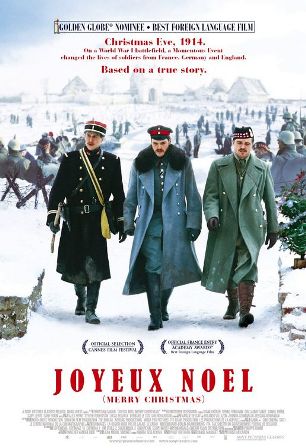Joyeux Noël
By J.D. Cook
 Our #7 Christmas Film
Our #7 Christmas Film
Released: November 9, 2005
Directed by: Christian Carion
Get this movie now!
This is a film that really does not get enough attention. I’m not sure why this is since it’s fabulous. It tells the true story of Christmas 1914 in the trenches of World War One. In the modern day religion is looked down on as an opiate for the masses, to quote Karl Marx. People seem to be forgetting that religion has been a fundamental force for peace in the world. In the case of the spontaneous truce of World War One; Christianity literally halted a war and brought men of diverse backgrounds together in brotherhood for a short time. While black marks in religious history are made to dominate our political and film lives; Joyeux Noël shows us that there has been quite a few white ones too. The film weaves various plots through the film and before it gets to the happiness around Christmas it shows the brutality of World War One in gritty detail. There are multiple main characters on opposite sides of the fighting. What initially drew me into the film at a glance was German actress Diane Kruger who I had known from National Treasure and Inglorious Basterds. I immediately loved that Kruger spoke German in the scenes in which only Germans were present. The French spoke French and the Scottish spoke with English accents. It really lends some authenticity when a film does that.
Once I got into the film I was deeply moved by the representation of the scene in which the Germans and the Scottish come together. The Scottish soldiers are playing bagpipes to remind them of home while a German opera singer (played by Benno Furmann) is serenading the German troops. The German opera singer than leaves his trench carrying a Christmas tree and singing ‘Adeste Fideles’ while the Scottish bag pipe player plays a backing tune. When the song is over the two sides reach something of an understanding of peace. The rest of the film deals with the two sides coming to trust each other for a short period before their superiors squash the peace. The German soldiers who took part in the peace are disgraced by Germany; the opera singer and his wife played by Diane Kruger flee to the French lines to stay together. Organized religion is not totally untarnished in this film as one of the main characters is a Scottish Priest (played by Gary Lewis) who is told by his Bishop that taking part in the truce was wrong. The Bishop then preaches that Germans are evil and need to be killed in the name of Christ. The Scottish Priest then leaves his cross behind. This film shows a strong reaction by the powers that be (German, French, and English governments, Roman Catholicism) against the peace of the truce. Those powers know that if their soldiers do not fight they cannot have war. This is a deep Christmas film that shows humanities best and worst.

